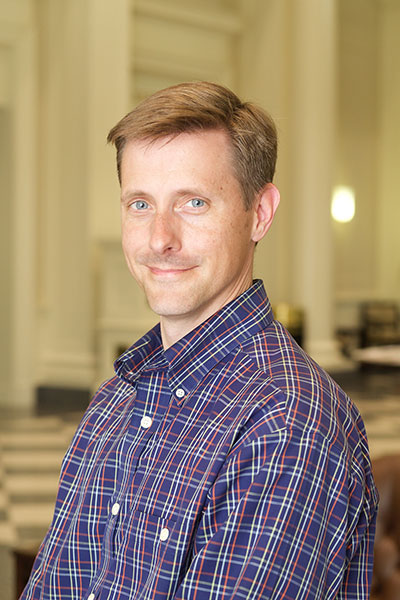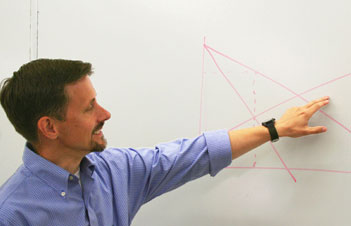
Outstanding Professor of 2015 cuts through "intimidating" economic principles

Charles (Chuck) Moul doesn't think he's intimidating. (Photo by Jeff Sabo)
by Carole Johnson, university news and communications
Some students find Chuck Moul intimidating. He laughs at the irony.
The slim Miami University economics associate professor grew up in a small Ohio town surrounded by burly classmates fixated on football while he pondered models of supply and demand.
In fact, he tells each of his students (1,000 over the past three years) that his goal is for them to become economically literate.
Moul is this year’s Outstanding Professor, named by Miami’s Associated Student Government for his “creativity, enthusiasm and dedication to students inside and outside of the classroom.” Professors are nominated by graduating seniors for having a profound impact.
Moul teaches difficult microeconomics concepts through the “simple” act of practice.
“When I was a student, you either got it or didn’t,” he said. “The biggest change in teaching economics now is that we have figured out more ways to let students practice. Part of a professor’s role is to motivate students to practice.”
To lessen the “intimidation factor” that he believes is more about the content than the teacher, Moul pulls in upper level undergraduate students who excelled in his courses to help with study sessions. He also provides students access to 15 years of previous exams for even more practice. Moul began teaching at Miami in 2008. He’s a 1994 Miami alumnus and received his doctorate in economics from Northwestern University.
Matt Arendas, now a senior economics major who leads study sessions, said Moul “is willing to take the time and sit down to discuss students’ grades, their understanding of the course and their hopes of what they plan to achieve in the class.”
Becca Jorgensen, a senior math and economics double major who plans to pursue her doctorate said, “ Dr. Moul's concern for students extends beyond the academic and post-graduate realm. I can't count the number of times I, or someone I know, needed advice or needed to be convinced the world is not really ending, and Dr. Moul was the one to do it.”

Practice is Chuck Moul's mantra. (Photo courtesy of Farmer School of Business)
By the end of the semester, Moul has all of his students thinking in mathematical models, but with a twist — a liberal arts perspective.
The students use the latest in templates and frameworks to think like microeconomists. They study how people currently work in the markets, but more importantly analyze how markets “should work” and what the economy “ought to do.”
“You don’t go to an economics class in the Farmer School of Business to just learn knowledge,” Moul said. “You go there to have your mind warped. If we do a good job, students recognize the value of being trained in this peculiar (analytical way) of thinking.”
Some theatrics also help with the learning factor. He’s been known to dress up in a tuxedo so students remember that the lesson that day — explaining economic theories about competition and welfare — is particularly important.
Among numerous other applied microeconomics topics, Moul’s research emphasizes empirical industrial organization, the study of monopolies. One recurring subject is the economics of motion picture distribution — a topic he can talk about anywhere and not “bore” the listener.
“The world is complicated. We need simplifying stories, and we need practice,” he said. “Students become most engaged when they can better understand a policy that they’ve been wondering about, but lacked the framework to do the analysis. It’s most rewarding when you can see the students make progress toward their own conclusions.”
Arendas admits that Moul’s introductory microeconomics course remains the hardest class he’s taken at Miami.
“I learned the theory and mathematical side of microeconomics, but my takeaway from the course was so much more. I learned how to budget my time, work with my professor, maximize my study resources, be passionate about my major and learn what an 'all-nighter' is all about.”
